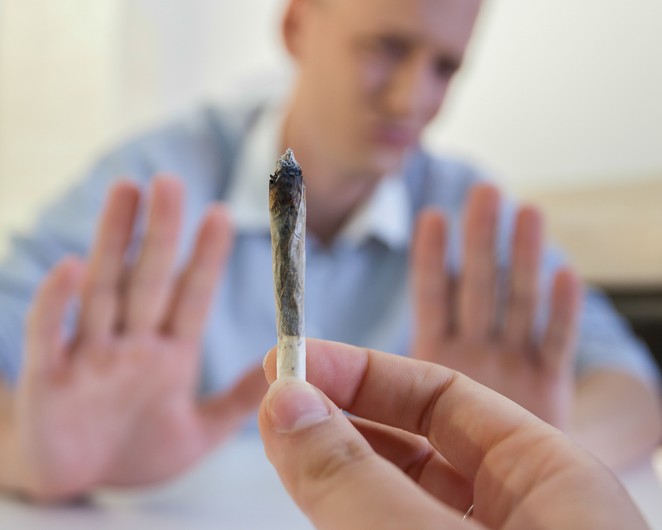
Cannabis is the most used illicit drug in the world, and the adverse effects associated with the drug are well documented (Budney et al 2007). Long term or heavy use of cannabis can increase the risk of dependence, with 10% of people who have used cannabis at least once expected to develop dependence (Wagner 2002).
The current recommended treatment for cannabis dependence is psychological therapies, such as motivational enhancement therapy or cognitive-behavioural therapy. Whilst pharmacotherapies (medications) are available for dependence on other substances, such as nicotine and opiates, there is currently no medication recommended by the guidelines to help people with dependence on cannabis.
A recent Cochrane systematic review (Marshall K et al, 2014) sought to identify trials that have tested whether pharmacotherapies can be effective in reducing the effects of cannabis withdrawal and promoting abstinence or reduced use.

At present, there are no guidelines recommending pharmacotherapies to help people with dependence on cannabis.
Method
To identify papers for inclusion in the review the authors searched databases, electronic sources of ongoing trials, reference lists and conference proceedings, and contacted experts in the field. They searched for both English and non-English language papers, although only English language papers were identified.
Fourteen randomised control trials (RCT’s) were included with a total of 958 participants. Where data was available on demographics of the samples, around 80% were male and the average age was 33 years. There was generally a low risk of bias in most areas across papers. However, there was often a high risk of attrition bias.
All 14 studies compared a medication with placebo and a range of medications were trialled, including:
- Medications containing tetrahydrocannabinol (THC): dronabinol (Levin 2011) and nabiximols (Allsop 2014);
- Selective serotonin reuptake inhibitor (SSRI) antidepressants: fluoxetine (Cornelius 2010) and escitalopram (Weinstein 2014)
- Mixed action antidepressants: nefazodone (Carpenter 2009), mirtazapine (Frewen 2007) and venlafaxine (Levin 2013)
- Anticonvulsant and mood stabilisers: divalproex sodium (Levin 2004), gabapentin (Mason 2012) and lithium (Johnston 2012)
- Atypical antidepressants: bupropion (Carpenter 2009; Penetar 2012)
- Anxiolytics: buspirone (McRae-Clark 2009)
- Selective norepinephrine reuptake inhibitor: atomoxetine (McRae-Clark 2010)
- A supplement promoting glutamate release and modulating N-methyl-D-aspartate (NMDA) receptor: N-acetylcysteine (Gray 2012)
The primary outcomes for the review were abstinence, intensity of withdrawal, adverse effects and completion of the treatment regime. Due to the range of medications tested and the outcomes reported, analysis was difficult and meta-analysis was often not possible.

Abstinence, intensity of withdrawal, adverse effects and completion of treatment regime were primary outcomes for the review.
Results
Abstinence
Data relating to abstinence was available for 4 types of medication (medications containing THC, SSRIs, mixed action antidepressants and anticonvulsants or mood stabilisers).
There was no significant difference in the likelihood of abstinence from cannabis at the end of treatment for any of the medications compared to placebo. However, two individual papers suggested positive effects on reduction compared to placebo, for both gabapentin and n-acetylcysteine.
Intensity of withdrawal
Due to variation and small numbers, meta-analysis was not possible on the data for intensity of cannabis withdrawal. However, several studies individually reported significant results:
- For medications containing THC, nabiximols resulted in significantly lower levels of cravings, irritability, anger and aggression compared to placebo, and dronabinol resulted in significantly less withdrawal discomfort than placebo
- Gabapentin showed a significant reduction in withdrawal symptoms compared to placebo
- Withdrawal discomfort scores were significantly higher in those taking placebo compared to those taking bupropion
No other medications showed significant differences compared to placebo.

Some positive results were found for compounds containing THC, gabapentin, N-acetylcysteine and bupropion
Adverse effects
There is data to suggest that the adverse effects were greater in the medication group compared to the placebo group in trials of compounds containing THC, buspirone and atomexetine; however, the data was insufficient to make any conclusions.
Completion of treatment
Completion of treatment was more likely for those taking a medication containing THC than those taking placebo (2 RCTs; 207 participants; RR 1.29, 95% CI 1.08 to 1.55, p=0.006).
There was no significant difference in completion of treatment between any other medication and placebo.

Completion of treatment is more likely for people taking a medication containing THC.
Conclusion
There is a lack of evidence for all medications included in the review. As a result, it is difficult to make any conclusions about the effectiveness of pharmacotherapies for cannabis dependence.
From the limited evidence that is available, it appears that compounds containing THC showed the most promise, due to their potential to reduce the effects of withdrawal and improve treatment adherence (although they had no significant effect on abstinence or reduction). Gabapentin, N-acetylcysteine and bupropion also showed some beneficial effects, whist all other medications included in the review have no evidence to support their use.

Compounds containing THC show most promise, in terms of their potential to reduce withdrawal effects and improve treatment adherence.
Although some benefits for certain medications were seen, the evidence is insufficient to inform clinical practice and more research is needed on these pharmacotherapies; specifically testing different combinations and doses of medication with longer durations of treatment.
The review was unclear about whether or not the participants of the various studies were receiving any form of psychological treatment for cannabis use, in addition to the medication, which could have potentially influenced the results. To increase the reliability of these studies, and to be able to say with confidence that medications have beneficial results, they should be trialled in people receiving no additional treatment.
On the other hand, whilst medication can be useful, and is often the first line of treatment for many disorders, it would make sense if medications for cannabis dependence were trialled alongside psychological therapies, as increasing motivation to change and developing relapse prevention strategies are fundamental aspects of treatment which cannot be gained through taking a medication alone.

It is unclear whether or not the participants were receiving psychological treatment, in addition to the medication, which could have potentially influenced the results.
Links
Marshall K, Gowing L, Ali R, Le Foll B. Pharmacotherapies for cannabis dependence. Cochrane Database of Systematic Reviews 2014, Issue 12. Art. No.: CD008940. DOI: 10.1002/14651858.CD008940.pub2
Budney AJ, Roffman R, Stephens RS, Walker D. Marijuana dependence and its treatment. Addiction Science & Clinical Practice 2007; Vol. 4, issue 1:4–16.
Wagner FA, Anthony JC. From first drug use to drug dependence; developmental periods of risk for dependence upon marijuana, cocaine, and alcohol. Neuropsychopharmacology 2002; Vol. 26, issue 4:479–88.
Allsop DJ, Copeland J, Lintzeris N, Dunlop AJ, Montebello M, et al. Nabiximols as an agonist replacement therapy during cannabis withdrawal: a randomized clinical trial. JAMA Psychiatry 2014; 71 (3):281–91. DOI: 10.1001/jamapsychiatry.2013.3947 [Pubmed abstract]
Carpenter KM, McDowell D, Brooks DJ, Cheng WY, Levin FR. A preliminary trial: double-blind comparison of nefazodone, bupropion-SR, and placebo in the treatment of cannabis dependence. American Journal on Addictions 2009; 18 (1):53–64.
Cornelius JR, Bukstein OG, Douaihy AB, Clark DB, Chung TA, et al. Double-blind fluoxetine trial in comorbid MDD-CUD youth and young adults. Drug and Alcohol Dependence 2010; 112 (1-2):39–45.
Frewen A, Montebello ME, Baillie A, Rea F. Effects of mirtazapine on withdrawal from dependent cannabis use. Proceedings of the 69th Annual Scientific Meeting of the College on Problems of Drug Dependence; June 16-21; Quebec City, Canada 2007. 21.
Gray KM, Carpenter MJ, Baker NL, DeSantis SM, Kryway E, et al. A double-blind randomized controlled trial of N-acetylcysteine in cannabis-dependent adolescents. American Journal of Psychiatry 2012; 169(8):805–12. DOI: 10.1176/appi.ajp.2012.12010055
Johnston J, Lintzeris N, McGregor I, Guastella A, Allsop D, Helliwell D, Winstock A. Preliminary findings from a double blind, randomised, placebo controlled trial of lithium carbonate for the management of cannabis withdrawal [conference abstract]. Drug and Alcohol Review 2012; 31:45.
Levin FR, McDowell D, Evans SM, Nunes E, Akerele E, Donovan S, et al. Pharmacotherapy for marijuana dependence: a double-blind, placebo-controlled pilot study of divalproex sodium. American Journal on Addictions 2004; 13:21–32.
Levin FR, Mariani JJ, Brooks DJ, Pavlicova M, Cheng W, Nunes EV. Dronabinol for the treatment of cannabis dependence: A randomized, double-blind, placebo-controlled trial. Drug and Alcohol Dependence 2011; 116:142–50. DOI: 10.1016/j.drugalcdep.2010.12.010
Levin FR, Mariani J, Brooks DJ, Pavlicova M, Nunes EV, et al. A randomized double-blind, placebo-controlled trial of venlafaxine-extended release for co-occurring cannabis dependence and depressive disorders. Addiction 2013; 108 (6):1084–94. DOI: 10.1111/add.12108
Mason BJ, Crean R, Goodell V, Light JM, Quello S, Shadan F, et al. A proof-of-concept randomized controlled study of gabapentin: effects on cannabis use, withdrawal and executive function deficits in cannabis-dependent adults. Neuropsychopharmacology 2012; 37:1689–98. DOI:10.1038/npp.2012.14
McRae-Clark AL, Carter RE, Killeen TK, Carpenter MJ, Wahlquist AE, Simpson SA, Brady KT. A placebo-controlled trial of buspirone for the treatment of marijuana dependence. Drug and Alcohol Dependence 2009; 105:132–8. DOI: 10.1016/j.drugalcdep.2009.06.022
McRae-Clark AL, Carter RE, Killeen TK, Carpenter MJ, White KG, Brady KT. A placebo-controlled trial of atomoxetine in marijuana-dependent individuals with attention deficit hyperactivity disorder. American Journal on Addictions 2010; 19(6):481–9.
Penetar DM, Looby AR, Ryan ET, Maywalt MA, Lukas SE. Bupropion reduces some of the symptoms of marihuana withdrawal in chronic marihuana users: A pilot study. Substance Abuse: Research and Treatment 2012; 6:63–71.
Weinstein AM, Miller H, Bluvstein I, Rapoport E, Schreiber S, et al. Treatment of cannabis dependence using escitalopram in combination with cognitive-behavior therapy: A double-blind placebo-controlled study. American Journal of Drug and Alcohol Abuse 2014; 40(1):16–22. DOI: 10.3109/00952990.2013.819362 [Pubmed abstract]


RT @Mental_Elf: Pharmacotherapies for reducing cannabis dependence http://t.co/7JOj2Wo16D
@Mental_Elf @kathryn_amy87 Wonder how many studies noted THC v CBD content? High-THC maybe more ‘addictive’? (a friend told me)
Raluca Lucacel liked this on Facebook.
Olivia Cialdi liked this on Facebook.
RT @Mental_Elf: Today @kathryn_amy87 summarises the @cochranecollab review on medications for the treatment of cannabis dependence http://t…
Diabolical proposals for drugs to treat #cannabis ‘dependence’ #breakthetaboo http://t.co/6qo3BDjCtt http://t.co/fAAJb6lvi8
Simply diabolical proposals to use toxic, dangerous drugs to treat a ‘problem’ which doesn’t really exist.
It must be against every standard of professional ethics even to make these suggestions and, as is shown, there is no evidence they do any good.
@Mental_Elf @rb_psy CBD research is promising! http://t.co/tEanBtpFbK fingers crossed for current trial at UCL – http://t.co/exxmRLfauj
@cathy__davies @Mental_Elf Lots yet to learn, not least re CBD as antipsychotic http://t.co/gunrwZhhjp
@rb_psy @Mental_Elf nice article. indeed-we’re looking @ effects of CBD in those at risk psychosis w/fMRI. nxt few yrs will be v.interesting
#Marijuana Tweets: Pharmacotherapies for reducing cannabis dependence: Diabolical proposal… http://t.co/dWOAhUB97y #middleton #heywood
#Cannabis CLEAR Feed Pharmacotherapies for reducing cannabis dependence: Diabolical proposa… http://t.co/yqIU2bZf6A #endthetaboo #weed
#Weed #News: Pharmacotherapies for reducing cannabis dependence: Diabolical proposals for… http://t.co/yqIU2bZf6A #rochdale #stockport
Experimental application of THC preparations for cannabis dependence. Read our summary of #CochraneEvidence http://t.co/7JOj2Wo16D
Pharmacotherapies for reducing cannabis dependence http://t.co/SwYHs8f3v4 via @sharethis
Ha http://t.co/qQC84V8uwU
Hi Peter, Thanks for your comment.
You say that the ‘problem’ of cannabis dependence doesn’t really exist. The Cochrane review that we highlighted in our Mental Elf blog says this:
“Cannabis use causes significant adverse effects (Budney 2007a). The acute effects of short-term cannabis use (Volkow 2014) include impaired memory (Solowij 2008); impaired motor co-ordination with an associated increased risk of involvement in motor vehicle accidents (Hall 2009); altered judgement; and, in high doses, paranoia and psychosis. Long-term or heavy use of cannabis has been associated with: the development of dependence (Budney 2007a), chronic bronchitis, and increased risk of chronic psychosis disorders in persons with a predisposition for development of such disorders (Volkow 2014). When use is commenced early in adolescence, long-term or heavy cannabis use has also been associated with altered brain development, poor educational outcome, cognitive impairment (Solowij 2008), and diminished life satisfaction and achievement (Gruber 2003).
It has been estimated that some 10% of those who have used cannabis at least once will develop cannabis dependence (Wagner 2002). Based on a large epidemiological survey in the USA, it has been estimated that, among those exposed once to cannabis, 7.0% of males and 5.3% of females will develop cannabis dependence at some point in their life, while 47.4% of males and 32.5% of females will develop cannabis use disorders (abuse or dependence) at some point in their life (Lev-Ran 2013a).”
I think this is quite a compelling argument that short- and long-term cannabis use can lead to problems for users. We know that there has been an increase in people asking for help (treatment for cannabis dependence), so it’s important that we find safe and effective interventions to help people.
This Cochrane review certainly does not provide strong evidence for the use of medication for cannabis dependence, but it does paint a picture of an emerging evidence-base that needs to be built on with further research. I was particularly interested in the finding that “compounds containing THC (tetrahydrocannabinol) show most promise, in terms of their potential to reduce withdrawal effects and improve treatment adherence”.
Cheers,
BTW – I’m Andre Tomlin – the person behind The Mental Elf. Hello!
The Mental Elf liked this on Facebook.
This is hilarious! You become dependent on your fridge that’s it.
.@Cochrane find limited evidence for pharmacotherapies to reduce #cannabis dependence http://t.co/7JOj2Wo16D
@Mental_Elf @cochrane interesting review, although many of these papers do not measure or account for variation in cannabis..
Wow, that is ridiculous. Tell us how afdficting MJ is;
FACT Marijuana is less addictive and less harmful than Caffeine, let alone Alcohol and Tobacco; (3 Scientific Studies)
BTW, Dr Henningfield is a former NIDA Staffer;.
Addictiveness of Marijuana – ProCon.org.
http://www.procon.org/view.background-resource.php?resourceID=1492
Haha….which drugs kill??? #ReeferMadness http://t.co/MOA21prTii
Pharmacotherapies for reducing cannabis dependence. http://t.co/A2Oz5tgovL
Mental Elf: Pharmacotherapies for reducing cannabis dependence http://t.co/eNDk4xeI6D
Don’t miss: Pharmacotherapies for reducing cannabis dependence http://t.co/7JOj2Wo16D #EBP
heh, Fluoxetine in place of cannbis use? You people are aware that Fluoxetine is a Fluoride aren’t you? You were testing to see if you could replace a dependency to a cancer treating , benign herb with a “medication” containing Fluoride….. Says it all to be honest…
Andre, the overlooked issue here is WHAT KIND of cannabis use leads to dependency. Unfortunately, the Elf seems to be obsessed with showing pictures (3) of H-ot B-urning O-verdose M-onoxide Joints but no mention of Vaporisation or a 25-mg flexdrawtube One-Hitter. Every Joint is a drug cocktail of Heat Shock, monoxide and 4221 Combustion toxins producing AVOIDABLE symptoms– including probably dependency– attributed to cannabis by medical authorities who make a ton of money “treating” preventable $igarette-$moking-related illnesses.
To children whose parents followed advice to keep them ignorant about cannabis, every Joint– and every picture of a Joint– is $igarette advertising. If the pernicious paper roll-up format disappeared from the planet, “dependency” on tobacco, cannabis or any “$moking” might largely disappear with it.
Farmacotherapie voor het verminderen van cannabis afhankelijkheid via @mental_elf http://t.co/BYf24Bokuq
Pharmacotherapies for reducing cannabis dependence, a cochrane review summarized by @Mental_Elf http://t.co/ZAapGOuoKk